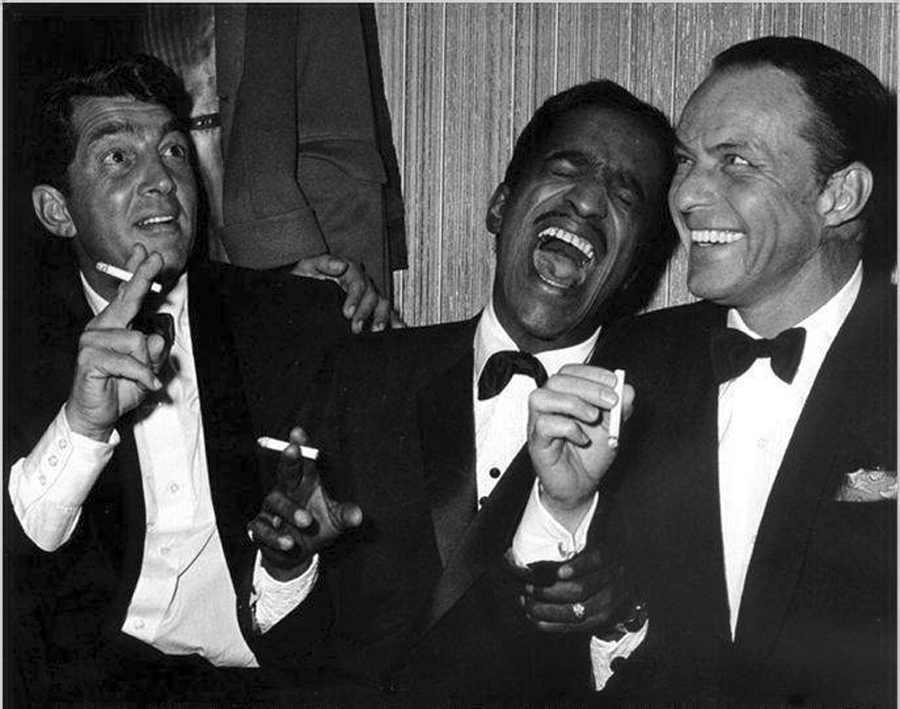These days if you want to catch merry hell, you write something on Twitter. You can also do yourself in quite nicely on Instagram or Facebook. It should be noted, however, that once upon a time radio was the place to fall on your duff. The case of singer Sammy Davis Jr. comes to mind. I am drawing this instance from one of James Kaplan’s books: Sinatra: The Chairman.

Frank Sinatra, as even many young people know, presided over a small collection of famous friends called the “Rat Pack.” Prominent among these celebrities were Dean Martin, Joey Bishop, Peter Lawford, and one of my favorite singers, the aforementioned Davis Jr. They served as the famous crooner and Hollywood star’s drinking buddies, yea sayers, and weekend warriors. They often revelled with him in Las Vegas, where they all partied and performed. During these events they toasted and roasted each other, but never mentioned the Pack’s number one Inconvenient Truth: that Frank Sinatra was a maniac.

Fond of physically attacking reporters and tearing up the clothing of associates whom he decreed disloyal, public acknowledgment of Sinatra’s violent tendencies was so dangerous that its open discussion sometimes launched careers. This was the case with the young insult comedian Don Rickles, who at some point in the late 50s noticed Sinatra in the audience at the Fontainebleau club in Miami. “Make yourself comfortable Frank,” Rickles proclaimed. “Hit somebody.” Shocked silence followed this comment. Only when Sinatra himself began to laugh did the rest of the room follow suit.
One night in 1959 Brat Packer par excellence Sammy Davis Jr. made the mistake of appearing on a late night Chicago based talk radio program called The Chez Show, hosted by a treacherous gossip named Jack Eigen. Aware of his own dicey reputation, Eigen began the conversation “all sweetness and light,” in Kaplan’s words. “The strategy worked,” the author continues, and it “didn’t take long for the subject of Frank Sinatra to come up.” Eigen hinted that Davis’ friend could be a “difficult person,” upon which his guest began to dig his grave.
“I love Frank,” Davis began:
” . . . and he was the kindest man in the world to me when I lost my eye in an auto accident and wanted to kill myself. But there are many things he does that there are no excuses for. Talent is not an excuse for bad manners . . . it does not give you a right to step on people and treat them rotten. This is what he does occasionally.”
Sinatra received the news of this candor with a host of racial epithets, followed by Davis’ excommunication. He quickly lost his role in The Chairman’s next movie Never So Few. “For the next few months Sammy was on his knees begging for Frank’s forgiveness,” Peter Lawford later recalled, “but Frank wouldn’t speak to him.” Eventually repatriation was negotiated, and Davis received a spot in Ocean’s 11 – as a sanitation worker.
I bring this uncomfortable story up for a variety of reasons. First, it’s a good radio yarn and this is a blog about radio. Second, there is a new PBS documentary about Sammy Davis Jr. that is on my short list to watch.
And finally, I just want to reminisce on the days when radio was Twitter. In the 1950s and 1960s, people rarely if ever spoke on network television the way they talked on the radio. TV, as the forgotten radio personality Fred Allen lamented, was the triumph of machines over people. Radio was where you still could get real, for better, or, as in the case of Sammy Davis Jr., for worse.


